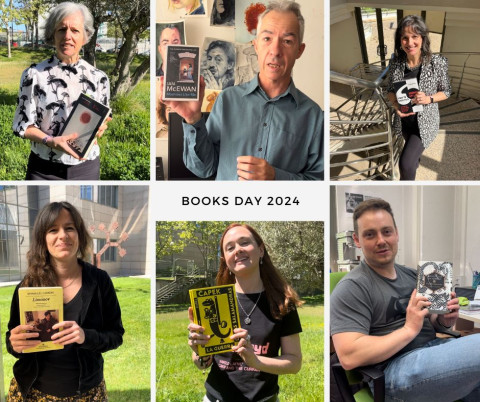28 books recomendations by ICMM staff

What does a scientist read? What does the person who manages all those research projects read? And who welcomes us every morning when we enter our center? At the Materials Science Institute of Madrid, we celebrate Book Day 2024 with a week full of literature: on social media, and starting from the Night of the Books (April 19th), our staff has stood in front of the camera to talk about a book that has fascinated them.
Additionally, we compile in this text the 28 titles that have been mentioned in these conversations. Because any day is good to talk about books, but even more so if it's April, spring has arrived... and the sun invites you to sit on a bench and enjoy a passionate reading.
We have a bit of everything: from comics and comedy (Alex Misol talks about Notes on a Thesis by Tiphaine Rivière) to the best-selling essay of the decade: Sapiens (Y.N. Harari), recommended by Manuel Vázquez, which has its family version in Unstoppable us, a diary of how we conquered the earth, and, coincidentally, recommended by Begoña Morales.
Speaking of essays, we have them for all audiences: Amparo Ruiz recommends How to Talk to Science Deniers by Lee McIntyre; Gloria González talks about The Immortal Life of Henrietta Lack by Rebecca Skloot; The Final Meeting by Sándor Márai, and Goodbye, Things: How to Find Happiness with the Art of Less by Fumio Sasaki. Manuel Vázquez, on the other hand, gives us a list of very interesting titles: The Europeans by Orlando Figes; Warped Passages by Lisa Randall; Why Nations Fail by Daron Acemoglu and James Robinson; The Silk Roads: A New History of the World by Peter Frankopan; and last but not least: The World of Yesterday: Memoirs of a European, written by Stefan Zweig: "we should all read at this time," according to Vázquez.
Talking about the lessons literature teaches, Joab Guerrero recommends: Julius Fučík in Notes from the Gallows. It is his writings during his stay from 1942 to 1943 in Pankrác prison, in former Czechoslovakia, when he was arrested by the Gestapo during the Nazi invasion of Czechoslovakia.
There has also been a bit of poetry: Belén Illana opts for It, by Inger Christensen, for its combative verses, and Ángela Bonachera says we can't live without reading Felicity, by Mary Oliver (Pulitzer Prize 1984), for its ode to life even in the darkest moments.
With everything, the preferred genre has been fiction, so here we go: José Ángel Martín Gago, director of the center, says we should read Games of the Late Age by Luis Landero; Sol Carretero doesn't want to give away much of Confessions by Jaume Cabré, but what she says about it sounds pretty good. Agustín, our receptionist, is in love with A Confederacy of Dunces by John Kennedy Toole; while Lourdes Boizas and Vanessa Sánchez opt for mystery novels: The Search by Charlotte Link, and It by Stephen King.
Our recommendations don't end here, of course. Science fiction has a prominent place with the suggestions of Lucrecia Teran (War with the Newts by the Czech Karel Čapek), Eduardo Hernández (Machines Like Me by Ian McEwan), or Asier Medel (the mythical 1984 by George Orwell); although we also have fantasy (Alex Misol recalls that it was thanks to The Idhun Chronicles by Laura Gallego that he got hooked on reading). In the end, the most repeat topic in our recommendations is about reflections on humanity from different points of view: Bernd Wicklein impresses with Hunger by Knut Hansum; Thomas Pucher rescues the classic Outside Looking In by T.C. Boyle; and Gulsum Ersu brings another classic: The Picture of Dorian Gray by Oscar Wilde, Eduardo Hernández also talks about Freedom by Jonathan Franzen; and Ana Espinosa concludes this short list with Limonov by Emmanuelle Carrere, "because it's the story of a fascinating character."
ICMMSor Juana Ines de la Cruz, 3 |  |
Contacto | Accesibilidad | Aviso legal | Política de Cookies | Protección de datos

